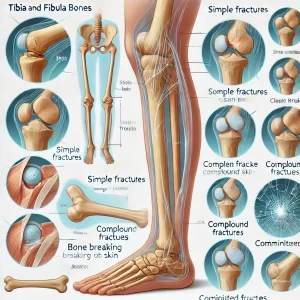
Car accidents are one of the leading causes of serious orthopedic injuries, including fractures to the tibia and fibula bones in the lower leg. These injuries can be severe, requiring extensive medical treatment and long recovery periods. In Georgia, victims of car accidents who suffer from tibia and fibula (tib-fib) fractures may have legal options for seeking compensation. This post explores the nature of these injuries, their treatment, and the legal considerations involved in pursuing a claim.
The tibia, or shinbone, is the larger and stronger of the two bones in the lower leg. It bears approximately 85% of the body’s weight. The fibula, or calf bone, is the thinner bone running parallel to the tibia and plays a crucial role in stabilizing the ankle and supporting lower leg muscles.
Fractures to these bones can vary in type and severity, including:

Tib-fib fractures in car accidents often occur due to high-impact trauma, including:
The treatment approach depends on the fracture’s severity and type:
Tib-fib fractures can lead to complications such as:
Under Georgia law, car accident victims may seek compensation if they can prove that another party’s negligence caused their injuries. Key legal aspects include fault, statutory limitations, and types of compensable damages.
Building a strong case requires gathering compelling evidence, such as:
Tibia and fibula fractures are serious injuries that can have a profound impact on a victim’s life. If you or a loved one has suffered such an injury in a car accident in Georgia, it is crucial to understand your legal rights. Consulting with a knowledgeable attorney can help ensure that you receive the compensation you deserve to cover medical expenses, lost wages, and other damages
Get Your Free Consultation Today
required fields *
